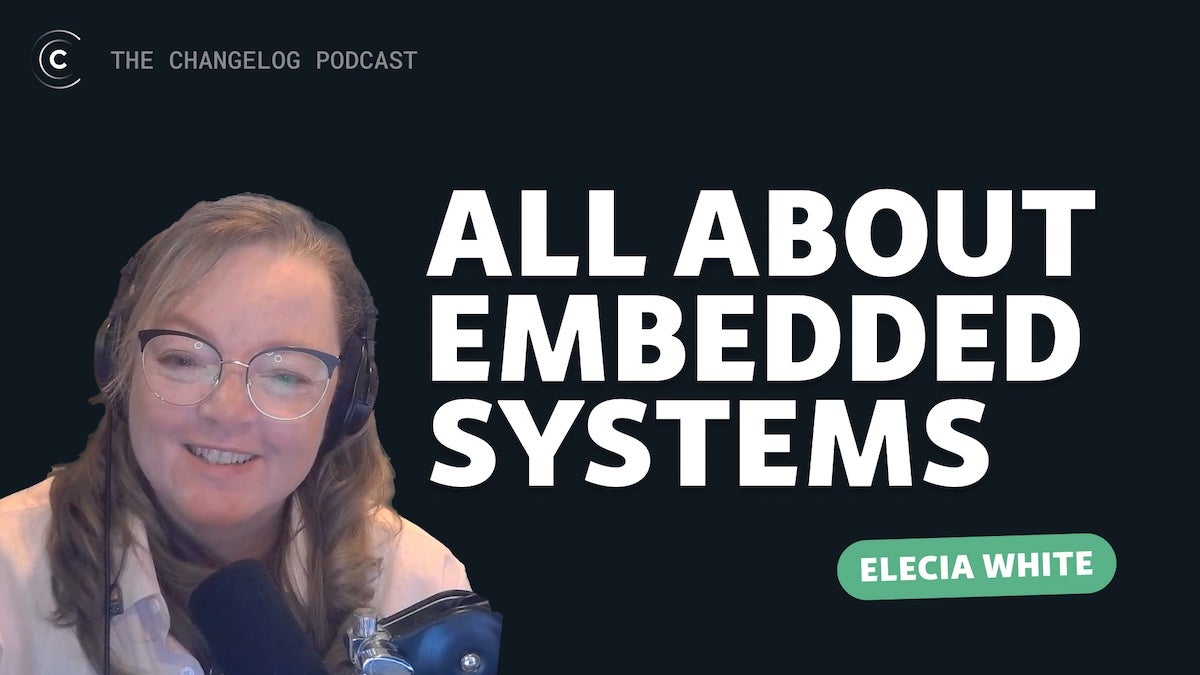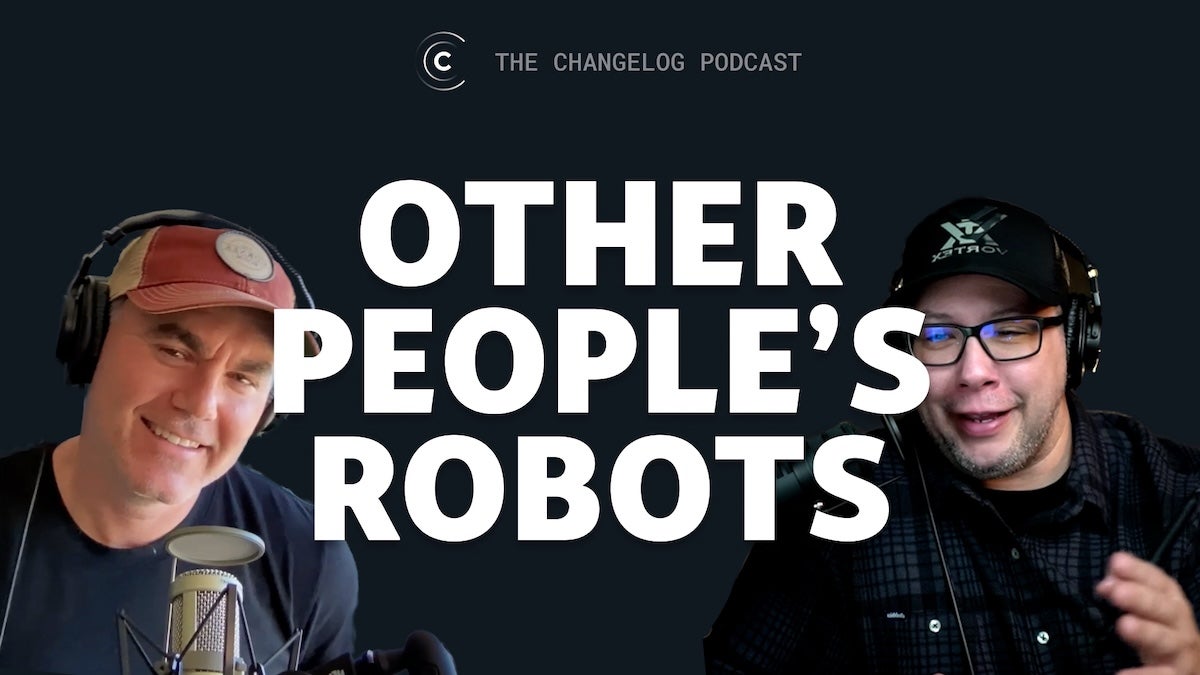Changelog News
Developer news worth your attention
Jerod again! 👋
Ever heard of coyote time? No, not your annual Coyote Ugly rewatch party.
It’s an affordance in video game design, where the game intentionally waits a brief period after you run off the side of a platform before it plummets you to your eminent demise. It’s named after the Wile E. Coyote cartoons and it’s apparently been making me feel better at video games than I actually am for the entirety of my life.
Ignorance, as they say, is bliss! Ok, let’s get into the news.
🎧 The world of embedded systems
Elecia White joins us to discuss all things embedded systems. We discuss programming non-computers, open source resources for embedded, self-driving cars, embedded system like the GoPro, Traeger smokers, and even birthday cards. According to Elecia, embedded is going everywhere. VIDEO
❤️🩹 It’s time to make computing personal again
Benj Edwards deftly describes how “surveillance capitalism and DRM turned home tech from friend to foe” by asking a litany of rhetorical questions about the past:
- What percentage of your income had to go towards annual software subscriptions on a 20th century Windows PC?
- Which part of this TV set kept track of everything you watched and then secretly sold the data to advertisers?
- Which part of Windows 95 fed you ads without your consent and kept track of everything you did remotely so Microsoft could keep stats on it?
- Which part of Amazon.com in 2000 tried to get you to buy millions of no-name counterfeit and dangerous goods propped up by stealth advertising and fake reviews?
- Which part of Google in the 1990s and early 2000s blanketed its results with deceptive ads or made you add “Reddit” to every search to get good results that weren’t overwhelmed by SEO-seeking filler content?
When you say it like that… he continues:
Every generation looks back and says, “Things used to be better,” whether they are accurate or not.
But I’m not suggesting we live in the past. It is possible to learn from history and integrate the best of today’s technology with fair business practices that are more sustainable and healthy for everyone in the long run.
Benj has a few ideas on what we can do individually to push this ideal forward, but he believes it will take collective action to make meaningful changes:
Whether through purposeful reform or the eventual collapse of digital strip mining, I believe the personal computer will eventually rise again—–along with our chance to reclaim control of our digital lives.
👎 Thoughts on a month with Devin
Hamel Husain, Isaac Flath & Johno Whitaker from Answer.AI put Devin (the product whose creators promised it to be a fully autonomous software engineer) through its paces. They were optimistic:
…something about Devin felt different. If it could deliver even half of what it promised, it could transform how we work. But while Twitter was full of enthusiasm, we couldn’t find many detailed accounts of people actually using it.
Their conclusions confirm my priors, so I’m happy to share them with you. 😉
Johno says:
Tasks it can do are those that are so small and well-defined that I may as well do them myself, faster, my way. Larger tasks where I might see time savings I think it will likely fail at. So no real niche where I’ll want to use it.
Isaac’s take:
I had initial excitement at how close it was because I felt I could tweak a few things. And then slowly got frustrated as I had to change more and more to end up at the point where I would have been better of starting from scratch and going step by step.
Hamel’s findings:
Devin struggled to use internal tooling that is critical at AnswerAI which, in addition to other issues, made it difficult to use. This is despite providing Devin with copious amounts of documentation and examples. I haven’t found this to be an issue with tools like Cursor, where there is more opportunity to nudge things in the right direction more incrementally.
I think Hamel’s last comment nails it. The current state of the art in generative AI coding tools, despite impressive demos, only brings meaningful value when paired with a competent human programmer to “nudge things in the right direction” at every step.
💯 Why senior engineers should stay ICs
For many successful software engineers, management seems like the only path toward career advancement. Asaf Zamir, however, has learned something quite different after years in the industry:
In my years of mentoring developers, I’ve seen too many brilliant engineers jump into management because they thought it was the only way forward. But here’s the thing - the IC path isn’t just a valid choice; for many, it’s the path that leads to their highest potential and greatest satisfaction.
In this post, Asaf makes his case for the IC path. If you’re sold on the idea, he also lays out four strategies to build your IC career around:
- Develop Your Technical Brand
- Seek Out Technical Leadership Opportunities
- Stay Current and Curious
- Build Strong Relationships
💰 Tech Talks: Coding with AI
Thanks to Augment Code for sponsoring Changelog News
On January 30th, you can watch Augment Code in action during this live demo.
But what is Augment Code, anyway? It’s the developer AI for complex codebases, providing you with real-time, deep understanding of the code so you can be super productive right away:
Augment taps into your team’s collective knowledge — your codebase, documentation, and dependencies. It’s the most context-aware Developer AI, so you won’t just code faster, you’ll build smarter.
Join solutions architect, Anshuman Pandey, while he demos how it can help you:
- Get up to speed on new projects
- Write effective unit tests
- Refactor legacy code
Don’t just code faster. Build smarter with Augment Code! Register here and they’ll send you a link to join the talk and an email reminder before the session.
📚 The Seven-Action Documentation model
Fabrizio Ferri Benedetti thinks most of the existing documentation frameworks focus too much on the tech writers and not enough on the actions of users who are consuming the docs.
The prescriptive emphasis on what docs must be produced instead of describing what user needs should be addressed echoes an architectural mindset where one builds walls because of course a house must have rooms, what are we, barbarians? This apparent lack of flexibility disincentivizes writing the content that’s needed.
Fabrizio proposes a new documentation model that is centered on seven actions that the docs are meant to satisfy. The actions are (roughly in order, but not strictly)
- Appraise
- Understand
- Explore
- Practice
- Remember
- Develop
- Troubleshoot
He develops and explains each action and the approach you’d take in providing docs to accompany the user on their way, finishing with this:
As it happens with theoretical models, this one isn’t backed by extensive research or factorial analysis. The model is distributed AS IS, and under no circumstances can you hold me accountable for having ruined your lunch. However, I hope it provides a useful perspective for technical writers seeking to create more purposeful documentation.
🏭 A standards first web framework
Nue creator, Tero Piirainen:
Today Nue takes a new, more natural direction: it becomes a standards first web framework. The focus has always been to strip away artificial layers and help developers take modern HTML, CSS, and JavaScript to their absolute peak. This shift is important, because now we can more directly work on solving the two key issues in frontend development
Those two key issues, as Tero sees them, are “the frontend engineering problem”, which can perhaps be boiled down to “React and friends spoil the fun”, and “the design engineering problem”, which can perhaps be boiled down to “JavaScript monoliths spoil the fun.”
Tero is disappointed with the fontend ecosystem, so he’s building something that he hopes will show the old, new way to build better websites.
🎙️ Other people’s robots
Adam & I discuss Nvidia’s recently announced personal AI supercomputer, Waymo’s latest infinite loop, what’s involved in getting a “modern” terminal setup, and whether or not AI has gone mainstream… warts & all! VIDEO
💡 You have built an Erlang
Dear friend,
I regret to inform you that, despite your best intentions, you have built an Erlang.
I know all you wanted was to “keep it simple.” You just needed a way to notify your services when data changed—nothing fancy.
A dedicated background job system or message bus? Too much. “YAGNI,” you said, confident you could sprinkle a few API calls here and there.
But now, six months later, your once-pristine codebase is riddled with ad-hoc HTTP calls. Like an invasive species, these calls have spread through your business logic, impossible to remove without ripping out half the ecosystem.
That’s just the opener…
🤑 Using coding skills to make passive income
In his closing keynote of PyCon South Africa, Cory Zue shared a decade of firsthand advice on going from an employed software developer to successful indie hacker running your own business(es). This post embeds his talk and provides a nice TL;DR with seven bulleted highlights, including this one, which is a nice kicker:
It’s worth it! The autonomy and freedom are unmatched by any other career.
🐌 Docker on macOS is still slow?
Almost two years since Paolo Mainardi wrote Docker on macOS is slow and how to fix it, he’s back with another deep-dive on what’s going on when Docker runs in a virtualized environment like macOS or Windows. Here are his main takeaways, but click through for the nitty gritty!
- Performance Has Improved
- New Solutions Are Emerging
- File Synchronization is Game-Changing
- Best Practices Still Matter
- Platform Choice Matters
📐 Links! Get yer (un)ordered links!
- FFmpeg By Example
- Fish 4.0: The Fish Of Theseus
- Five years of React Native at Shopify
- Rewriting my website in plain HTML & CSS
- Why we chose long polling over WebSockets
- A port of Doom (1993) that runs inside a PDF file
- 1Crossword: crosswords for your password manager
- Using LLMs to help LLMs build Encore apps – Encore Blog
- Why does Cloudflare Pages have such a generous Free tier?
- tirreno: User security analytics for mission-critical web apps
- Escape the walled garden and algorithm black boxes with RSS feeds
- yek reads text-based files quickly, serializes them for LLM consumption
That’s the news for now, but we have some great episodes coming up this week:
- Wednesday: Ashley Jeffs on selling Benthos to Redpanda
- Friday: Kris Brandow & Matthew Sanabria from Fallthrough
Have a great week, forward this to a friend who might dig it & I’ll talk to you again real soon. 💚
–Jerod

